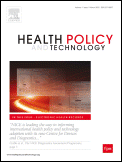
Health Policy and Technology
Scope & Guideline
Bridging the gap between technology and health policy.
Introduction
Aims and Scopes
- Health Technology Assessment (HTA):
The journal publishes research that evaluates the effectiveness, efficiency, and impact of health technologies, including digital health tools and medical devices, on health outcomes and healthcare systems. - Digital Health Innovations:
Research on the development, implementation, and evaluation of digital health technologies such as telemedicine, mobile health applications, and electronic health records is a core focus. - Healthcare Policy Analysis:
The journal explores the implications of health policies on the adoption and utilization of technologies in healthcare, including the regulatory frameworks and economic evaluations. - Integrated Care Models:
Studies that propose and assess novel integrated care strategies, especially those that leverage technology to enhance patient-centered care and improve health system efficiency. - Societal and Behavioral Aspects of Health Technology:
Research examining how social determinants, user acceptance, and behavioral factors influence the adoption and effectiveness of health technologies.
Trending and Emerging
- Artificial Intelligence in Healthcare:
There is a growing body of research focused on the applications of artificial intelligence in clinical decision-making, patient management, and health system efficiency, indicating a significant trend towards leveraging AI technologies. - Telehealth and Remote Care Models:
The COVID-19 pandemic has accelerated interest in telehealth and remote care solutions, leading to a surge in studies evaluating their effectiveness, user acceptance, and policy implications. - Health Equity and Technology Access:
Emerging research focuses on how health technologies can address health disparities and improve access to care for underserved populations, emphasizing the role of technology in promoting health equity. - Integration of Behavioral Health and Primary Care:
There is an increasing emphasis on integrated care models that combine behavioral health and primary care using technology to enhance patient outcomes, reflecting a holistic approach to health. - User-Centric Design in Digital Health Solutions:
Research is trending towards understanding user experiences and the design of digital health solutions to ensure they meet the needs of diverse populations, highlighting the importance of usability in technology adoption.
Declining or Waning
- Traditional Health Services Research:
There has been a noticeable decrease in studies focused solely on traditional health services research without the integration of technology, as the journal pivots towards more innovative and technology-driven approaches. - Single-Disease Focused Studies:
Research that concentrates exclusively on single diseases, without considering broader health system implications or the role of technology in management, appears to be declining. - Regulatory and Compliance Studies:
While important, studies solely focused on regulatory compliance without discussing technological advancements or their impacts on healthcare delivery are becoming less common. - General Health Promotion Strategies:
Research that discusses general health promotion strategies without a specific emphasis on digital or technological interventions is less frequently published, indicating a shift towards more technology-centric health promotion.
Similar Journals
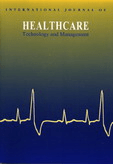
International Journal of Healthcare Technology and Management
Bridging Technology and Management for Enhanced Healthcare DeliveryThe International Journal of Healthcare Technology and Management is a premier scholarly publication that delves into the intersection of technology and management within the healthcare sector. Published by InderScience Enterprises Ltd since 1999, this journal offers a platform for researchers, healthcare professionals, and students to share and discuss innovative solutions and management practices that enhance healthcare delivery. Despite its current standings in the Q4 category for Health Informatics and Leadership and Management, the journal remains a vital resource for emerging trends and interdisciplinary actions that can influence the future of healthcare technology. With an emphasis on empirical research and practical applications, the journal aims to foster collaboration and knowledge dissemination among the healthcare community. Although not currently open access, it remains accessible to academic institutions and professionals worldwide. Since its inception, the journal has consistently aimed to provide high-quality content that addresses significant challenges in healthcare technology, making it an essential asset to any academic or professional library.

Healthcare in Low-resource Settings
Advancing healthcare equity in resource-limited environments.Healthcare in Low-resource Settings, published by PAGEPRESS PUBL in Italy, is an esteemed open-access journal that has been committed to advancing knowledge and innovative practices in the healthcare domain since 2013. With an E-ISSN of 2281-7824, this journal focuses on critical issues pertinent to health policy, public health, and social sciences, particularly in settings marked by limited resources. Despite its recent categorization in the Q4 quartile for various health-related disciplines in 2023, the journal serves as a vital platform for disseminating research aimed at improving health outcomes in underserved populations. Researchers, professionals, and students alike can access its content freely, promoting widespread engagement and exchange of ideas within the global health community. By publishing high-quality, peer-reviewed articles, Healthcare in Low-resource Settings seeks to bridge gaps in healthcare knowledge and advocates for sustainable solutions to pressing health issues, particularly in vulnerable communities.
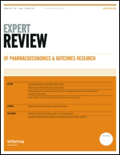
Expert Review of Pharmacoeconomics & Outcomes Research
Fostering Innovation in Health Policy and PharmacologyExpert Review of Pharmacoeconomics & Outcomes Research is a leading journal published by TAYLOR & FRANCIS LTD, focusing on the critical intersection of pharmacoeconomics and healthcare outcomes. Established in 2001, the journal has been a key resource for researchers and professionals in the fields of health policy, medicine, and pharmacology, consistently ranked in the top quartile of these categories for its influential insights. With an ISSN of 1473-7167 and an E-ISSN of 1744-8379, it delivers cutting-edge research that informs healthcare decisions and policy frameworks. The journal's rigorous peer-review process ensures the publication of high-quality, impactful articles that address contemporary challenges and advancements in pharmacoeconomic evaluations. As of 2023, it boasts a commendable ranking of #106 in Health Policy and #124 in Pharmacology, affirming its relevance and contribution to the field. Despite being a subscription-based journal, the strength of its content makes it an invaluable tool for researchers and practitioners aiming to enhance patient outcomes and optimize resource allocation in healthcare systems.
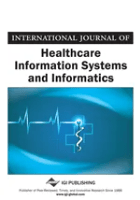
International Journal of Healthcare Information Systems and Informatics
Fostering dialogue on critical healthcare informatics advancements.International Journal of Healthcare Information Systems and Informatics is a prestigious academic journal published by IGI Global, focusing on the vital intersection of healthcare and information technology. With an ISSN of 1555-3396 and E-ISSN of 1555-340X, this journal serves as a pivotal platform for researchers, professionals, and students to explore innovative solutions and advancements in healthcare informatics. As of 2023, it holds a commendable Q3 ranking in categories such as Information Systems and Medicine, highlighting its significant contribution to the academic community. Covering a wide range of topics from healthcare data management to the implementation of information systems in clinical settings, the journal aims to foster critical discussions and disseminate impactful research. With a publication history spanning from 2006 to 2024, it continues to play a crucial role in guiding the future of healthcare information systems. Readers can access this journal through traditional subscription methods, ensuring that leading-edge research reaches those most invested in the evolution of healthcare informatics.

Exploratory Research in Clinical and Social Pharmacy
Navigating the future of pharmacy through exploratory research.Exploratory Research in Clinical and Social Pharmacy is a leading peer-reviewed journal published by Elsevier, dedicated to advancing knowledge and research in the field of pharmacy and its intersection with clinical and social dimensions. Since its inception in 2021, the journal has carved out an essential niche in the academic community, as reflected by its strong impact factor and reputable category rankings, including Q3 in Health, Toxicology and Mutagenesis, Q3 in Pharmacology (Medical), and Q1 in Pharmacy as of 2023. The journal aims to disseminate innovative research findings, case studies, and reviews that address contemporary challenges and solutions within the pharmacy discipline, making it a vital resource for researchers, healthcare professionals, and students alike. With its emphasis on open access, Exploratory Research in Clinical and Social Pharmacy is committed to promoting inclusive and widespread expertise within the field, facilitating collaboration and knowledge transfer across global audiences. For its readers, this journal promises to be an invaluable tool for staying updated with the latest trends and advancements in pharmacy practice and research.
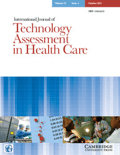
INTERNATIONAL JOURNAL OF TECHNOLOGY ASSESSMENT IN HEALTH CARE
Pioneering assessments that redefine health technology landscapes.INTERNATIONAL JOURNAL OF TECHNOLOGY ASSESSMENT IN HEALTH CARE is a leading academic journal published by Cambridge University Press, specializing in the critical evaluation of healthcare technologies and their impact on health policy. Established in 1970, it has gained recognition within the field, currently holding a prestigious Q2 ranking in Health Policy, with a commendable position of #89 out of 310 in the Scopus rankings, placing it in the 71st percentile. The journal serves as an essential platform for researchers, professionals, and students interested in the intersection of technology and health care, facilitating the dissemination of innovative research findings and practical assessments that inform policy-making and improve health outcomes. With a focus on advancing knowledge from 1985 to 2024, the journal's content remains relevant and impactful. Though not open access, it offers subscription-based access to a wealth of articles that contribute to shaping the future of healthcare technology assessment.

Lancet Digital Health
Shaping the Future of Medicine with Digital Solutions.Lancet Digital Health is an esteemed Open Access journal published by ELSEVIER, dedicated to advancing the interdisciplinary field of digital health. Since its inception in 2019, the journal has rapidly established itself as a leading platform for disseminating high-quality research focusing on the implications of digital technology in healthcare delivery, health informatics, and patient management. Renowned for its rigorous peer-review process and commitment to academic excellence, Lancet Digital Health currently holds prestigious Q1 rankings across multiple categories including Decision Sciences, Health Informatics, and Medicine (miscellaneous) as of 2023. With an impressive impact in its field—ranked #1 in Health Informatics and within the top percentile of related disciplines—this journal offers vital insights into the ongoing transformations within health systems globally. Researchers, healthcare professionals, and students alike will find a wealth of cutting-edge studies, practical applications, and discussions on the future of digital health, fostering an evidence-based dialogue that is essential in today's rapidly evolving medical landscape.

Zeitschrift fur Evidenz Fortbildung und Qualitaet im Gesundheitswesen
Shaping health outcomes with impactful evidence and education.Zeitschrift für Evidenz Fortbildung und Qualität im Gesundheitswesen, published by Elsevier GmbH, serves as a pivotal platform for the dissemination of research and innovations within the realms of health policy, medicine, and education. Established in 2008 and continuing its impactful trajectory through 2024, this journal boasts a recognition as a Q2 journal in Education and positions itself within the Q3 tier for both Health Policy and miscellaneous Medicine categories, reflecting its dual focus on scholarly rigor and practical application. Despite not being an Open Access journal, it remains a valued resource for academics and practitioners, evidenced by its rankings: #214 out of 398 in Medicine (miscellaneous) and #829 out of 1543 in Social Sciences (Education) according to Scopus metrics. The journal's commitment to enhancing education and quality in healthcare makes it an essential read for researchers, professionals, and students seeking to stay abreast of the latest evidence-based practices and policies that shape health outcomes worldwide.

INFORMATION RESEARCH-AN INTERNATIONAL ELECTRONIC JOURNAL
Pioneering Insights for a Global Information Community.INFORMATION RESEARCH - AN INTERNATIONAL ELECTRONIC JOURNAL is a distinguished open-access journal published by the University of Sheffield's Department of Information Studies, situated in England. Since its inception in 1995, the journal has been at the forefront of disseminating research findings in the field of Library and Information Sciences, earning a commendable Q2 ranking in the category for 2023. With an ISSN of 1368-1613 and an E-ISSN of 1368-1613, it serves as a vital resource for scholars, practitioners, and students alike, providing a platform for innovative insights and engaging discussions. The journal accepts submissions from diverse perspectives related to the information research domain and contributes to the ongoing dialogue among academic professionals worldwide. With a Scopus ranking placing it at 150 out of 280 in its field, this publication underscores its importance in shaping the future of information studies while enabling wide accessibility to cutting-edge research.
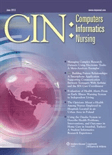
CIN-COMPUTERS INFORMATICS NURSING
Advancing Nursing Through Innovative InformaticsCIN-COMPUTERS INFORMATICS NURSING is a distinguished journal that publishes cutting-edge research at the intersection of nursing and information technology. Published by Lippincott Williams & Wilkins, the journal has been a pivotal platform since 2002, catering to the needs of health informatics professionals and nursing researchers. With an impressive impact factor and ranked within Q2 in Nursing (miscellaneous) and other relevant categories, it serves as a key resource for advancing knowledge and best practices in the field. The journal's inclusion in important databases ensures broad visibility and access to the latest findings that influence healthcare delivery. CIN-COMPUTERS INFORMATICS NURSING welcomes a diverse range of articles, including empirical studies, reviews, and innovative methodology approaches, making it an invaluable asset for clinicians, educators, and scholars dedicated to enhancing nursing informatics and improving patient outcomes.